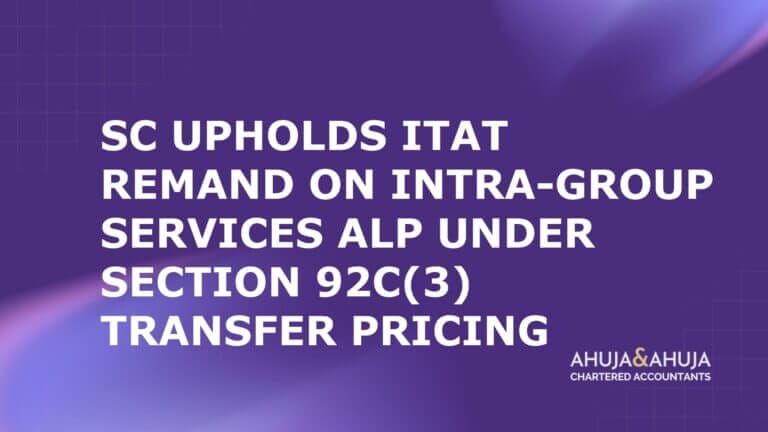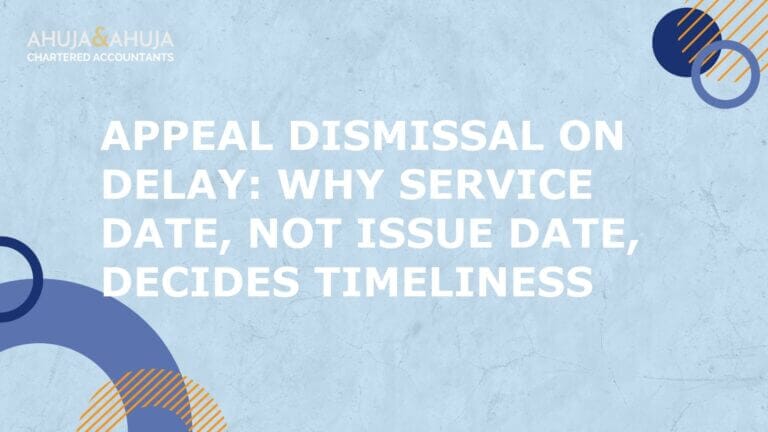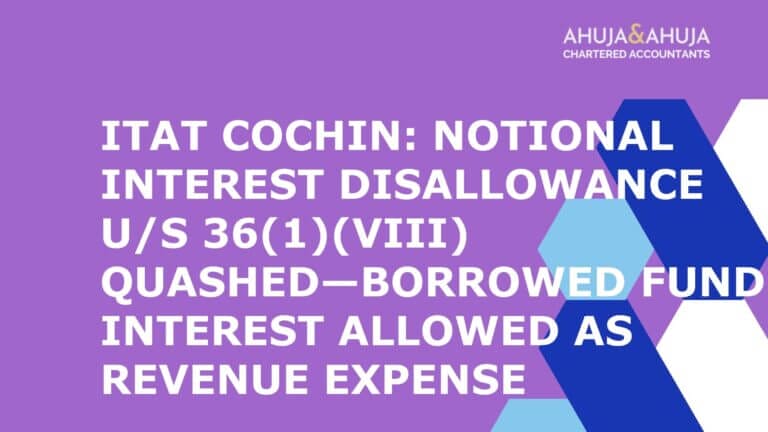Calcutta HC Quashes IT Order under Sec 148A(d): No Personal Hearing Violates Natural Justice
The Calcutta High Court’s recent decision in Winsome Highrise Pvt. Ltd. & Anr. vs Union of India & Ors. has sent ripples through the Indian tax community. By setting aside an income tax reassessment order for AY 2018-19 due to the Assessing Officer’s failure to grant a personal hearing under Section 148A(d), the Court has underscored the non-negotiable role of procedural fairness in tax administration. This article unpacks the judgment, its legal reasoning, and the practical impact for CA professionals and taxpayers.
The New Reassessment Regime and Section 148A(d)
India’s reassessment framework underwent a significant overhaul with the introduction of Section 148A in the Income Tax Act, 1961. The section was designed to bring greater transparency and fairness to the process of reopening assessments. Section 148A(d) specifically mandates that before issuing a notice under Section 148, the Assessing Officer (AO) must decide, after considering the taxpayer’s reply, whether it is a fit case for reassessment. Crucially, the law also provides for an opportunity of being heard—often referred to as a “personal hearing”—if requested by the taxpayer.
What Does Section 148A(d) Require?
- Statutory Mandate: The AO must consider the taxpayer’s reply to the show-cause notice and, if the taxpayer requests, provide a personal hearing before passing an order under Section 148A(d). This reinforces the importance of application of mind when approving assessment orders in tax proceedings.
- Procedural Fairness: The hearing is not a mere formality. It is a substantive right, intended to allow the taxpayer to present their case, clarify facts, and address the AO’s concerns in person or through authorised representation.
The Winsome Highrise Case: Where Did the AO Go Wrong?
In the Winsome Highrise matter, the sequence of events was telling:
- The AO issued a show-cause notice under Section 148A(b), outlining the reasons for reopening the assessment. For detailed procedural insights, professionals can refer to our post on Decoding Section 148A: Strategic Responses and Procedural Insights for Notice u/s 148A(b).
- The taxpayer, through its authorised representative, specifically requested a personal hearing to present its case.
- Despite this clear request, the AO proceeded to pass an order under Section 148A(d) and issued a notice under Section 148—without granting the requested hearing.
This omission was not a minor technicality. The Court found that the AO’s failure to provide a personal hearing, despite a specific request, amounted to a violation of the principles of natural justice.
Natural Justice: The Bedrock of Fair Tax Proceedings
Natural justice is a foundational principle in Indian law, especially in quasi-judicial proceedings like tax assessments. It comprises two core elements:
- Audi Alteram Partem (“hear the other side”): Every person must have a fair opportunity to present their case.
- Nemo Judex in Causa Sua (“no one should be a judge in their own cause”): Decision-makers must act without bias.
The Calcutta High Court, in this case, emphasised that the right to a personal hearing is not a discretionary favour but a statutory and constitutional guarantee. The Court’s reasoning was clear: when the law provides for a hearing upon request, denying it—especially when specifically sought—strikes at the heart of procedural fairness. This principle aligns with broader themes discussed in our blog on the Importance of Application of Mind when approving assessment orders.
Judicial Reasoning and Precedents
The Court drew upon established legal precedents, including Supreme Court rulings, which have consistently held that procedural safeguards cannot be bypassed in the name of administrative convenience. The judgment highlighted that the Income Tax Department’s own Standard Operating Procedures (SOPs) reinforce the need for a personal hearing when requested.
Immediate Implications for Reassessment Proceedings
This judgment is not just a one-off. It has immediate and far-reaching consequences:
- Ongoing Cases: Any reassessment proceeding under Section 148A where a personal hearing is requested but not granted is now vulnerable to legal challenge. Taxpayers should consider the guidance on Income Tax Litigation services for navigating such challenges.
- AO Conduct: Assessing Officers must treat hearing requests with utmost seriousness. Ignoring or denying such requests can render the entire reassessment process invalid. It is also important for AOs to understand their obligations in faceless assessment proceedings, where hearings may be conducted virtually.
- Legal Challenges: Taxpayers and their advisors are likely to scrutinise procedural compliance more closely, leading to a potential uptick in writ petitions and challenges to Section 148 notices.
Key Takeaways for CA Professionals and Taxpayers
- Assert the Right: Always request a personal hearing in reassessment proceedings where facts are complex or stakes are high. Many CAs in locations like Chandigarh and Ghaziabad have started emphasising this procedural safeguard.
- Document Everything: Keep a clear record of all communications, requests, and responses related to the hearing. Effective documentation can be reinforced using outsourcing services such as accounts outsourcing.
- Monitor Compliance: If a hearing is denied, consider legal remedies promptly—courts are likely to view such lapses seriously post this judgment.
Practical Steps for CA Professionals to Safeguard Client Rights
The Winsome Highrise judgment is a wake-up call for tax professionals. Chartered Accountants (CAs) play a pivotal role in ensuring that clients’ procedural rights are not just asserted, but also protected with robust documentation.
What should CAs do?
- Proactively Request Hearings: Whenever a show-cause notice under Section 148A(b) is received, assess whether a personal hearing will help clarify facts or address complex issues. If so, make a written request for a hearing—preferably through the e-filing portal or via email, ensuring an audit trail. This approach goes hand-in-hand with best practices in income tax return filing.
- Use Clear, Standardised Formats: Draft hearing requests in a clear, unambiguous manner. Include the relevant assessment year, PAN, and reference to the specific notice. Templates can help maintain consistency and reduce the risk of omissions.
- Follow Up and Record Responses: If there is no response to the hearing request, send a polite reminder and document all correspondence. Download acknowledgements and keep copies of all submissions.
- Maintain a Chronology: Prepare a timeline of all actions—notice received, hearing requested, reminders sent, responses received. This chronology can be invaluable if a procedural challenge arises.
Sample Template for Hearing Request:
Subject: Request for Personal Hearing under Section 148A(d) – AY 20XX-XX
Respected Sir/Madam,
With reference to your notice dated [date] under Section 148A(b), we hereby request a personal hearing as provided under Section 148A(d) of the Income Tax Act, 1961, to present our case and clarify the facts.
Kindly confirm the date and mode of hearing at your earliest convenience.
Regards,
[Authorised Representative/CA]
[Contact Details]
Obligations of Assessing Officers Post-Judgment
The Calcutta High Court’s ruling has raised the bar for Assessing Officers (AOs) in reassessment proceedings.
Key obligations now include:
- Mandatory Consideration of Hearing Requests: If a taxpayer requests a personal hearing, the AO must provide a reasonable opportunity before passing an order under Section 148A(d). This is not a matter of discretion.
- Reasoned Orders: The AO’s order should reflect that the hearing was granted (or, if not, the reasons for denial—though post-judgment, denial is fraught with risk).
- Updated SOPs: The Department may need to revise its Standard Operating Procedures to ensure that all officers are trained and equipped to handle hearing requests efficiently, including via video conferencing where appropriate. This is important as virtual hearings gain traction with faceless assessments.
- Consequences of Non-Compliance: Orders passed without granting a requested hearing are now highly vulnerable to being quashed by courts, as seen in Winsome Highrise.
Risk Landscape for the Revenue Department
The judgment exposes the Revenue to significant procedural risk:
- Adverse Orders: Any reassessment order passed without following the mandated procedure can be set aside, leading to loss of revenue and increased litigation. Advanced tax litigation tactics can be explored through Income Tax Litigation Services.
- Retrospective Impact: Taxpayers may challenge past orders where hearing requests were ignored, especially if proceedings are still open or under appeal.
- Need for Training: There is an urgent need for capacity-building among AOs to ensure procedural compliance and avoid costly lapses.
Addressing Misconceptions on Personal Hearings under Section 148A(d)
Many taxpayers and even some practitioners believe that a personal hearing is a mere formality or that it can be denied at the AO’s discretion. The Calcutta High Court has clarified:
- Personal Hearing is a Right, Not a Favour: If requested, it must be granted.
- Scope of Hearing: The hearing is not limited to oral submissions; it can include clarifications, presentation of documents, and addressing specific queries.
- No Blanket Denials: Administrative convenience or workload is not a valid ground to deny a hearing.
Impact on Drafting of Show-Cause Notices and Hearings by Tax Authorities
The precedent set by this judgment will influence how tax authorities draft notices and conduct hearings:
- Clear Communication: Notices must inform taxpayers of their right to request a personal hearing. This is part of broader efforts under the Income Tax Act to enhance taxpayer communication and procedural fairness.
- Detailed Documentation: AOs should maintain records of all hearing requests, dates, and the substance of discussions.
- Checklist for Compliance: Authorities may adopt checklists to ensure that every procedural step—notice, reply, hearing, order—is properly documented.
Preserving Documentary Evidence: Strategies for Taxpayers and Representatives
To safeguard rights and build a strong case in the event of a dispute:
- Maintain All Communications: Save emails, portal acknowledgements, and letters related to the reassessment. Outsourcing solutions like Payroll Outsourcing Services can help maintain administrative records.
- Document Timelines: Note the date of notice, date of hearing request, reminders, and responses.
- Audit Trail: Keep a file (physical or digital) with all supporting documents, including submissions made during the hearing.
Practical Example:
If a hearing is requested on 10th March and the AO passes an order on 15th March without granting the hearing, the taxpayer’s documented request and lack of response become crucial evidence in court.
Broader Impact on Indian Tax Litigation and Administrative Fairness
The Winsome Highrise decision is part of a larger trend towards strengthening procedural fairness in Indian tax law.
- Evolution of Fairness: Courts are increasingly unwilling to tolerate procedural shortcuts, especially where statutory rights are at stake. Readers interested in wider implications can refer to Direct Tax Vivad Se Vishwas (DTVSV) Scheme 2024 – A Comprehensive Guide.
- Ripple Effects: The logic of this judgment may extend to other quasi-judicial proceedings—customs, GST, and even non-tax administrative actions. For GST-related matters, see our GST Litigation Services.
- Policy Implications: The legislature and CBDT may consider clarifying or strengthening procedural safeguards to reduce litigation and enhance taxpayer confidence.
Key Takeaways and Forward Outlook
- For Professionals: Assert and document the right to a personal hearing. Advise clients to maintain a meticulous record of all interactions. CAs practicing in locations such as Delhi and Jodhpur can benefit from specialised Finance Services supporting these efforts.
- For Taxpayers: Know your rights—if you request a hearing, it must be granted. If denied, legal recourse is available.
- For Revenue: Procedural compliance is not optional. Training and updated SOPs are essential to avoid adverse judicial outcomes.
The Winsome Highrise precedent signals a shift towards a more robust, transparent, and equitable reassessment process. As the tax landscape evolves, procedural fairness will remain the touchstone of effective and just tax administration.
Disclaimer
The materials provided herein are solely for educational and informational purposes. No attorney/professional-client relationship is created when you access or use the site or the materials. The information presented on this site does not constitute legal or professional advice and should not be relied upon for such purposes or used as a substitute for professional or legal advice.







